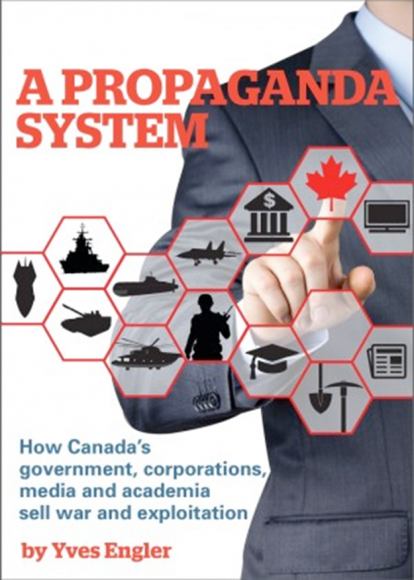
A Propaganda System
A Propaganda System: How Canada’s government, corporations, media and academia sell war and exploitation
By Yves Engler, Red Publishing/Fernwood Publishing, 237 pages
“Canada has seldom been a benevolent international actor. Rather it’s been close to the centre of a hierarchical international economic, political and military system that is particularly exploitative of ordinary people in the most vulnerable areas,” writes Yves Engler in his Introduction, adding that many who attend his talks are astonished when they come up against this reality. This is primarily due to Canada’s sophisticated propaganda system – the subject and title of Engler’s book released at the University of Winnipeg on November 2, 2016. The release was very timely, followed closely as it was by the US presidential elections that turned the deliberate dissemination of propaganda, hoaxes and misleading disinformation into burning issues.
The title and subtitle that introduce the book’s feel and timbre are apt, becoming progressively clearer and more evidently valid as one reads on. The content is powerful and presented convincingly. For example, in a chapter called “Owning the Media” Engler writes: “Various factors explain the media’s biased international coverage. Most importantly, a small number of mega corporations own most of Canada’s media. These firms are integrated with the leading internationally focused Canadian companies and depend on other large corporations for advertising revenue. Less dependent on advertising, CBC relies on government funds and has long been close to the foreign policy establishment … A great deal of the international news Canadian media disseminates is produced by US sources.”
It is well known that in the US, financing news operations tends to be directed toward profit-based re-hashing of information for re-display rather than for investigative reporting. That motive seats N. American journalists squarely on the lap of business interests, sometimes with interlocking directorates. This was amply proved by media reporting on the Maher Arar case and on Iraq’s weapons of mass destruction, in recent memory.
US political journalism has collapsed to the point where politicians are positioned to manipulate the coverage of campaigns; we observe that its citizens are ill-equipped to participate meaningfully in their elections. The negative relationship of America’s media with the American people should not be allowed to infect Canada, but that is what is happening today.
As UK-based John Pilger points out: “Many journalists now are no more than channelers and echoers of what George Orwell called the ‘official truth’. They simply cipher and transmit lies. It really grieves me that so many of my fellow journalists can be so manipulated that they become really what the French describe as ‘functionaires’ [sic], functionaries, not journalists. Many journalists become very defensive when you suggest to them that they are anything but impartial and objective.”
Academic institutions have not been immune to this virus. In the chapter called “The Academic Connection,” Engler writes: “In 2011 multi-billionaire David Azrieli gave Concordia $5 million to set up the Azrieli Institute of Israel Studies … The Israeli-Canadian real estate magnate asserted that ‘I am a Zionist and I love the country’ and he was an officer in a largely Anglo-Saxon Hagganah Brigade responsible for a number of massacres during the 1947/48 war in which 750,000 Palestinians were ‘ethnically cleansed’ from their homeland … The institute is designed to erase Palestinians from their historical connection to their homeland.”
The book is exhaustively researched with an extensive bibliography and endnotes. There are chapters on the roles played by the military, academics, media, and others who toe the government’s disinformation line to suit their own financial interests.
The author’s purpose is to describe how “The idea of a benevolent Canadian foreign policy may be intellectually hollow, but it’s well-grounded in structures of propaganda.” He adheres to this thesis consistently, and accomplishes his purpose masterfully right through until the very last page.
The book is well organized and convincing, with simple chapter titles that may be read in any order, according to the reader’s preference. The writing is formal, appropriate to its subject, and the wording easy for the ordinary seeker of truth, calling for little effort on the latter’s part.
The author is well qualified to research this book, having published eight other books on the Canadian situation. He uses the analogy of a “hype-generating and self-consciously influence-peddling NHL team PR department” as a foreign affairs equivalent at various points in the narrative: “Just as the Montréal Canadiens are in the business of moulding everything written about the Habs, official military historians have shaped foreign policy consciousness,” using similar techniques.








